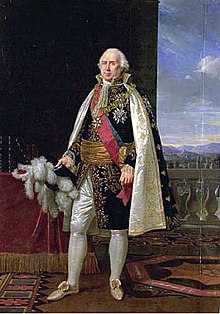Charles-François Lebrun, duc de Plaisance
| Charles-François Lebrun | |
|---|---|

Portrait of Charles-François Lebrun, duc de Plaisance, by Robert Lefèvre, 1825
|
|
| Third Consul of the French Republic | |
|
In office 12 December 1799 – 18 May 1804 |
|
| Preceded by | Napoleon Bonaparte, Emmanuel Joseph Sieyès and Roger Ducos (as Provisional Consuls) |
| Succeeded by | Republic abolished |
| Member of the Council of Five Hundred | |
|
In office 22 August 1795 – 9 November 1799 |
|
| Deputy of the National Constituent Assembly | |
|
In office 9 July 1789 – 30 September 1791 |
|
| Member of the Estates General for the Third Estate | |
|
In office 6 May 1789 – 6 June 1789 |
|
| Constituency | Dourdan |
| Personal details | |
| Born | 19 March 1739 Saint-Sauveur-Lendelin, Manche, Kingdom of France |
| Died |
16 June 1824 (aged 85) Sainte-Mesme, Yvelines, Kingdom of France |
| Spouse(s) | Anne Delagoutte |
| Children | Anne-Charles Lebrun, 2nd duc de Plaisance Alexander Lebrun Sophie-Eugenie Lebrun Auguste-Charles Lebrun Dorothée Lebrun |
Charles-François Lebrun, 1st duc de Plaisance, (19 March 1739 – 16 June 1824) was a French politician and statesman who served as Third Consul of the French Republic and was later created Arch-Treasurer and Prince of the Empire by Napoleon I.
Born in Saint-Sauveur-Lendelin (Manche), after studies of Philosophy at the Collège de Navarre, he started his career during the Ancien Régime, making his first appearance as a lawyer in Paris in 1762. He filled the posts of censeur du Roi (1766) and then Inspector General of the Domains of the Crown (1768).
During the early 1760s, Lebrun became a disciple of Montesquieu and an admirer of the British Constitution, travelling through Southern Netherlands, the Dutch Republic, and finally to the Kingdom of Great Britain (where he witnessed the debates in the London Parliament).
He became one of Chancellor René Nicolas de Maupéou's chief advisers, taking part in his struggle against the parlements and sharing his downfall in 1774. Lebrun then devoted himself to literature, translating Torquato Tasso's Jerusalem Delivered (1774) and the Iliad (1776). He retreated from public life to his property in Grillon, attempting to live a life as envisaged by the philosophe Jean-Jacques Rousseau. During the cabinet of Jacques Necker, he was consulted on several occasions, but never appointed to high office.
...
Wikipedia
